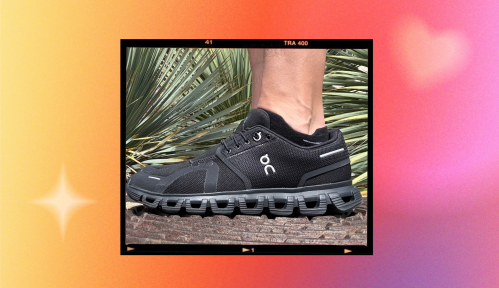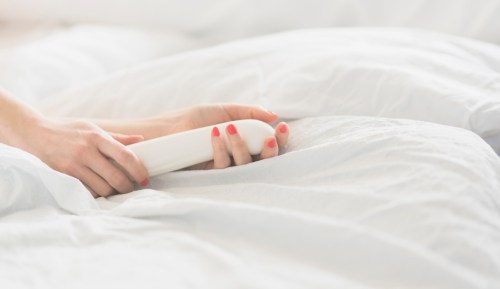Last October, when my complexion was at its all-time best, I decided to take a more minimalist approach to my skin-care and supplement routines in the name of saving money. I quickly realized that my skin wasn’t loving its new regimen, however, as redness, dryness, and tiny, inflamed bumps began dotting my cheeks and forehead. The more I tried to panic-treat myself, the worse my condition became, and by the end of 2019 my skin had erupted into a mess of papulopustular rosacea and cystic acne—two conditions I’d suffered from in the past, but figured that I’d outgrown at the age of 37. My dermatologist prescribed me four different topical treatments and one oral antibiotic over the following months, but none of them made a significant improvement.
From a lifestyle perspective, I’d already been doing all the things to clear my skin holistically: I haven’t touched dairy in almost a decade, I eat very little gluten or sugar, I rarely drink alcohol, and I take an array of skin-boosting supplements every night. Yet it got to the point where I couldn’t even hide my red, bumpy skin with makeup anymore, so I stopped leaving the house for anything other than grocery store runs and dog walks. (I was basically self-quarantining before anyone had ever heard of COVID-19.) As you can imagine, my mental health started to suffer. So I wasn’t surprised when my doctor eventually told me there was only one option left to treat my tricky combination of acne and rosacea: isotretinoin, more commonly known as Accutane, one of the drug’s many brand names.
As soon as my doctor said “Accutane,” I burst into tears.
As soon as she said the word, I burst into tears. I’d done my research and knew that isotretinoin is often the last resort for people with stubborn, severe acne and rosacea. As part of that research, I’d also spent hours watching YouTubers lament the depression, major digestive issues, joint pain, and hair loss they claimed to have experienced as a result of the medication. The thing is, I’d taken Accutane myself in my mid-20s and experienced only mild side effects. But the Accutane brand of isotretinoin was pulled from the market in 2009—the same year that I was taking it—amid a flood lawsuits from people who experienced serious health issues during or after their courses of the drug. (Several other brands of isotretinoin still remain, including Absorica, Claravis, and Sotret.) I may have had a smooth experience the first time, but I’d always told myself I would never test my luck again with a second round.
I’d always told myself I would never test my luck again with a second round.
When I told this to my dermatologist, she was quick to reassure me that many of the scariest reported side effects of isotretinoin are overblown or not backed up by conclusive evidence, and that the vast majority of her patients complete their 4-to-6 month course of the drug with no major issues. She also said I’d be thanking her in six months when my skin was clear and pain-free, perhaps permanently. Studies show that anywhere from 50-75 percent of patients never experience a relapse in acne after taking isotretinoin, depending on their dosage during treatment.
Even so, like most people who are faced with the prospect of taking a highly controversial and potentially dangerous drug, I still had hesitations. So I set out to learn whether Accutane’s bad reputation is warranted—or if its potential benefits outweigh its many risks.
What’s it like to take Accutane?
Accutane isn’t the kind of drug that a doctor would prescribe for mild, infrequent breakouts. It’s generally reserved for those with cystic or scarring acne, severe papulopustular rosacea, or severe folliculitis, says dermatologist Dendy Engelman, MD. It’s also not a drug that should be prescribed lightly, she adds. “We should exhaust all options for remedying cystic acne before turning to isotretinoin,” Dr. Engelman says. “When a patient is not responding to other treatments, then this can be a good option for them to try.” Some of these other treatments include topical and oral antibiotics and prescription-strength retinoids, the latter of which are in the same family as isotretinoin. “For women there is [also hormonal] birth control, an antibiotic-free medication called spironolactone, and then there are lasers and blue light—which work, but are not covered by insurance,” says dermatologist Kavita Mariwalla, MD.
Doctors consider Accutane a last resort because it does have the potential for some serious side effects. Most notably, the drug may cause birth defects, miscarriage, or stillbirth if a person becomes pregnant while taking it. This is why all Americans who are physically able to become pregnant must log on to an FDA-mandated digital portal called IPledge and either vow to remain abstinent or commit to using two forms of birth control—usually condoms and one other method—each month during the course of treatment. A negative pregnancy blood test is also required before a dermatologist can prescribe isotretinoin each month, as well as for one month before and after treatment. This process is as time-consuming and frustrating as it sounds, especially because patients only have a seven-day window each month to get their pregnancy test and pick up their prescription. If they miss that window, they have to wait a month before they can start their course of treatment again. What’s more, studies show that hundreds of women each year still become pregnant while taking isotretinoin, despite all of these strict measures.
Accutane isn’t the kind of drug that a doctor would prescribe for mild, infrequent breakouts.
On top of the pregnancy test, isotretinoin patients also need to have their cholesterol, triglycerides, and liver function monitored each month with a blood test (as in rare cases, the drug can negatively impact these things). Patients should never take tetracycline antibiotics while on Accutane, as this combination is linked to a condition called pseudotumor cerebrai that causes increased pressure on the brain. And then there’s a catalogue of much more common Accutane side effects that aren’t necessarily dangerous, but are still undesirable: extremely dry skin, eyes, and lips; nosebleeds; changes in night vision; increased sun sensitivity; thinning hair; and muscle and joint pain, to name a few. About one in five patients will also find that their acne worsens in the weeks before it starts to improve, which can be a not-so-pleasant surprise after expecting skin to clear from the get-go. “[Isotretinoin] causes the top layer of the skin to turn over more quickly, and that’s exacerbated by the fact that you’re simultaneously irritated and dry,” explains Mary Stevenson, MD, an assistant professor of Dermatology at NYU Langone Health. “It shouldn’t be the worst flare of your life, but once things get better, they really should continue to improve.”
Accutane remains popular because it’s the only drug to address all four main causes of acne.
Side effects are also known to be dose-dependent. The higher the medication dose, which is determined in part by the patient’s weight and height, the greater the chance of noticeable side effects. Because of this, many doctors today choose to put their patients on lower doses of the drug for longer periods of time. “Low-dose protocols of Accutane are extremely safe and have almost no side effects,” says dermatologist Zenovia Gabriel, MD, FAAD.
This Parisian Skincare Brand Is Launching in the United States for the First Time—Here’s What a Derm Wants You to Know

We’re Calling It: Cleansing Balms Are the Face Wash of the Future—Here Are 3 to Add to Your Cart

This Is the One Product That Scarlett Johansson Always Keeps in Her Purse and on Her Bedside Table

Despite the prospect of unwanted side effects, Accutane remains popular because it’s the only drug to address all four main causes of acne—it reduces the size and output of skin’s oil glands while keeping pores clear and free from excess bacterial buildup. “It’s not very well understood how it works so dramatically for so long, but ultimately you end up with less activity in your sebaceous glands,” says Dr. Stevenson. This effect is only temporary, says Dr. Gabriel. “Isotretinoin shrinks the oil gland during treatment, but two months after treatment, the cell morphology of your sebaceous glands goes back to normal,” she says. “However, you do see permanent clinical effects.”
Dr. Stevenson adds that although the drug generally leaves a person’s system about a week after they stop taking it, some of the Accutane side effects—namely, dry skin—may still linger. But ultimately, doctors strongly believe the risks are worth the reward. “I think isotretinoin is by far the most successful drug we have available for acne,” says Dr. Gabriel. “It works to make skin 100 percent clear—not just 30-50 percent better.”
But wait… isn’t Accutane also linked with depression and IBD?
Two of the most sinister reported Accutane side effects, depression and inflammatory bowel disease, are the most widely debated in the medical community. Both of these conditions have been linked to the drug, but studies haven’t yet been able to prove that isotretinoin causes them. “It’s difficult because it’s hard to study these things as the effect of one agent,” says Dr. Stevenson.
Take depression, for example. In 2000, former congressman Bart Stupak made headlines when he blamed Accutane for his 17-year-old son’s sudden suicide, suing the drug’s manufacturer, Roche, and bringing Accutane’s little-known link to depression into the spotlight. Since then, studies on the relationship between isotretinoin and mood disorders have been mixed. The American Academy of Dermatology’s position is that while there is some correlation between isotretinoin use and mental health issues such as depression and anxiety, there’s no conclusive evidence that isotretinoin is the root cause of these things. What’s more, there are studies that show isotretinoin can actually help improve symptoms of anxiety and depression, which makes sense considering that mental distress can be triggered by having severe acne in the first place.
Studies on the relationship between isotretinoin and mood disorders have been mixed.
Anecdotally, Dr. Gabriel reports that she does see minor mood disturbance in about 5 to 10 percent of her isotretinoin patients during treatment. “There’s no new onset of severe depression or high-grade anxiety, but rather a low-grade irritability,” she says. But ultimately, she adds, this side effect is generally mild and goes away after the patient ends their course of the drug. “With proper self-awareness and open communication with you doctor, [it] can be managed.”
Either way, Dr. Stevenson says that all patients should be aware of the correlation before embarking on a course of isotretinoin and exercise particular caution if they have a history of depression or suicidal thoughts. “You want patients to know there can be an idiosyncratic response where they may feel really bad, and if that happens, to stop taking the medication and call [their dermatologist] right away,” she says. “I think anyone who has a history of depression should also have a psychiatrist on board who checks in with them [during and after their course of treatment].”
The connection between isotretinoin and inflammatory bowel disease is also tenuous. When Accutane was discontinued in 2009, Roche claimed it was for financial reasons, with media citing declining sales in the face of increased competition from generics and an uptick in personal injury lawsuits. Through it all, the pharmaceutical company continued to staunchly vouch for the drug’s safety. Yet shortly before this, studies started to indicate that isotretinoin might serve as an IBD trigger in some patients, leading to speculation that this was the real reason behind Accutane’s downfall. Subsequent research was mixed—some showed no causation between isotretinoin and IBD, while another study demonstrated a small risk increase for ulcerative colitis with prior isotretinoin use. However, Dr. Stevenson says that more research needs to be done to conclusively connect the drug with an increase in IBD risk. “There’s not enough evidence to prove or disprove,” she says. “Sometimes that’s not a satisfying answer, but it’s the best data we have,” she says.
Bottom line: Are the Accutane side effects really worth it?
It’s impossible to generalize whether isotretinoin is a good option for everyone who needs it, as each person will react to it differently based on their own biology. But it’s important to remember there’s no rule stating a person has to complete a full course of the drug if they’re experiencing worrying side effects—they can stop taking it at any time. “It’s more like, can we continue this safely and if so, how? Or if, for whatever reason, is this not the right choice, what’s the next plan?” says Dr. Stevenson. This is why it’s so important to be up front with your dermatologist about any side effects during monthly appointments, she notes.
Plus, as mentioned before, isotretinoin is often the only thing that will help people with disfiguring and painful skin conditions, which is why Dr. Engelman says she considers it worth the risk in most cases. “Under the right supervision, this drug can be administered in a safe way and give relief to those with painful acne,” she says.
“For a healthy person with bad acne, Accutane can be a miracle.” —Mary Stevenson, MD
Dr. Stevenson agrees that the most serious Accutane side effects shouldn’t scare people off from considering it. “The vast majority of patients take it and do very well, and there are not a lot of things for the skin where we can be so definitively helpful,” she says. As for me? I decided to give isotretinoin a second chance. Thankfully, my skin fully cleared up within a month. I’m nearing the end of month two, and although I have noticed a few more side effects this time around—mild headaches, nausea, and soreness after I work out—it certainly helps to know the drug has so many derms’ blessings. Looking back at photos of my skin pre-treatment and grateful for how much I’ve healed already, I’m reminded of Dr. Stevenson’s words: “For a healthy person with bad acne, Accutane can be a miracle.”
This is the best foundation for acne-prone skin, according to dermatologists. And here are the most common acne questions Dr. Pimple Popper gets, along with her answers.
Sign Up for Our Daily Newsletter
Get all the latest in wellness, trends, food, fitness, beauty, and more delivered right to your inbox.
Got it, you've been added to our email list.








